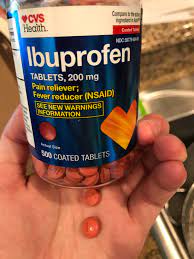How Much Ibuprofen (Advil) Can I Take In a Day?

Ibuprofen the active ingredient in Advil, belongs to a class of medications called NSAIDs. It works by stopping the body’s production of a substance that causes pain, fever, and inflammation. Prescription ibuprofen is used to relieve pain, tenderness, swelling, and stiffness caused by osteoarthritis (arthritis caused by a breakdown of the lining of the joints) and rheumatoid arthritis (arthritis caused by swelling of the lining of the joints). It is also used to relieve mild to moderate pain, including menstrual pain (pain that happens before or during a menstrual period).
Nonprescription ibuprofen is used to reduce fever and to relieve minor aches and pain from headaches, muscle aches, arthritis, menstrual periods, the common cold, toothaches, and backaches. For strains and sprains, some doctors and pharmacists recommend waiting 48 hours before taking ibuprofen as it may slow down healing. If you are unsure, speak to your doctor or pharmacist. Ibuprofen is typically used for period pain or toothache.
Ibuprofen acts by stopping the creation of certain prostaglandins, which are lipids that deal with injury or illness and are active in the pathways that control inflammation, pain, and fever. Ibuprofen inhibits the action of cyclooxygenase, which is necessary for prostaglandin creation. Ibuprofen is not selective and COX-2 prostaglandins are responsible for the desired analgesic and antipyretic effects.
How Much Ibuprofen Can I Take?
It is generally advised that you use ibuprofen exactly as directed on the label, or as prescribed by your doctor. Use the lowest dose that is effective in treating your condition. An ibuprofen overdose can damage your stomach or intestines. The maximum amount of ibuprofen for adults is 800 milligrams per dose or 3200 mg per day (4 maximum doses).
A child’s dose is based on the age and weight of the child. Carefully follow the dosing instructions provided with children’s ibuprofen for the age and weight of your child. Ask a doctor or pharmacist if you have questions.
Take ibuprofen with food or milk to lessen stomach upset.
Shake the oral suspension (liquid) before you measure a dose. Use the dosing syringe provided, or use a medicine dose-measuring device (not a kitchen spoon).
You must chew the chewable tablet before you swallow it.
Store at room temperature away from moisture and heat. Do not allow the liquid medicine to freeze.
What happens if I miss a dose?
Since ibuprofen is used when needed, you may not be on a dosing schedule. Skip any missed dose if it’s almost time for your next dose. Do not use two doses at one time.
What happens if I overdose?
Seek emergency medical attention or call the Poison Help line at 1-800-222-1222. Overdose symptoms may include nausea, vomiting, stomach pain, drowsiness, black or bloody stools, coughing up blood, shallow breathing, fainting, or coma.
Common side effects of ibuprofen
Ibuprofen is so widely used that it can be easy to forget this drug can cause side effects. Still, ibuprofen is a drug, and it comes with risks like any other drug.
The more common side effects of ibuprofen are:
- stomach pain
- heartburn
- nausea
- vomiting
- gas
- constipation
- diarrhea
Not everyone has these side effects. When they do occur, the effects are usually mild. Many people can prevent these side effects by taking ibuprofen with milk or food.
Serious side effects of ibuprofen
Serious side effects can also occur. Most of these risks are uncommon and can usually be avoided by taking ibuprofen as recommended.
However, taking too much ibuprofen or taking it for too long can make these serious side effects more likely.
Heart attack and stroke
For most people, the risks of heart attack and stroke are rare. However, your risks increase if you use too much ibuprofen or use it for too long. Your risk is also higher if you:
- have other risk factors for heart attack or stroke
- have a clotting disorder
- take other medications that affect how your blood clots
- If you have any risk factors or take other drugs, talk to your doctor before using ibuprofen.
Decreased kidney function and increased blood pressure
Prostaglandins help keep the pressure in your kidneys at the right level to filter the fluids in your body and maintain your blood pressure.
Ibuprofen changes your body’s production of prostaglandins. This change can lead to an imbalance in your body fluid pressure, which can decrease your kidney function and increase your blood pressure.
Symptoms of decreased kidney function include:
- increased blood pressure
- fluid buildup
- dehydration
- urinating less frequently
- dizziness
Your risk is increased if you:
- are an older adult
- have kidney disease
- take blood pressure medications
Ulcers and bleeding in the stomach and intestine
Prostaglandins also help maintain the constant repair of your stomach lining, which protects you from damage from stomach acid.
Because ibuprofen decreases how much prostaglandin you make, stomach damage such as bleeding and ulcers in the stomach and intestines is a possible side effect.
This side effect is fairly rare. However, the risk increases the longer you use ibuprofen. Other factors that increase your risk include:
- a history of ulcers or bleeding in your stomach or intestines
- older age
- use of oral steroids or the blood thinners known as anticoagulants
- smoking
- alcohol use, specifically more than three alcoholic beverages per day
If you have severe stomach pain or you notice bloody or tarry stools, you may have symptoms of an ulcer. Contact your doctor right away and stop taking ibuprofen.
Allergic reaction
Some people have an allergic reaction to ibuprofen, but this is also rare.
If you’ve had allergic reactions to aspirin, don’t take ibuprofen. If you start to have trouble breathing or your face or throat starts to swell, contact your doctor right away and stop taking ibuprofen.
Liver failure
There’s a very rare risk of liver failure after taking ibuprofen. If you have liver disease, talk to your doctor before taking ibuprofen. Stop taking ibuprofen and contact your doctor right away if you start to have any of the following symptoms:
- nausea
- tiredness
- lack of energy
- itchiness
- yellowing of your skin or the whites of your eyes
- pain in the upper right area of your abdomen
- flu-like symptoms
These may be signs of liver damage or liver failure.
Ibuprofen can be a safe and easy over-the-counter remedy (OTC) for minor aches and pains. However, if you don’t use it as recommended, ibuprofen can possibly be harmful.
It’s always smart to talk to your doctor before taking ibuprofen if you’re not sure if you should use it. If you experience bothersome side effects or believe you may have taken too much, contact your doctor right away.
Most of the serious side effects result from taking the drug when you shouldn’t, taking too much of it, or taking it for too long. You can reduce your risk of side effects by using the smallest possible dose for shortest possible time.





